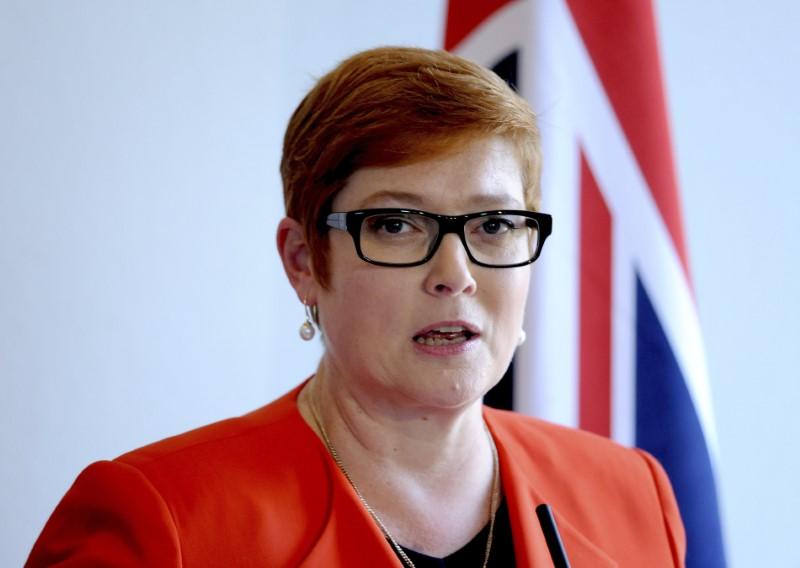SYDNEY—Australian Foreign Minister Marise Payne said Canberra will hold China to account on issues such as human rights, insisting that staying quiet on sensitive issues is not in Australia’s national interests.
Relations between Canberra and its most important trading partner have deteriorated in recent years amid accusations that China is meddling in Australian domestic affairs. Canberra also fears China is seeking undue influence in the Pacific region.
Souring relations have strained bilateral trade, prompting some business executives to call on Australia’s conservative government to prioritize economic policy above social advocacy.
“We must respect each other’s sovereignty, but we will consistently continue to raise issues such as human rights, including, as I have said, with China,” she said in the foreign policy speech.
“We will do so not just because we believe individual rights should apply to all people, but because we believe that nations that uphold such principles domestically are more likely to cooperate in ways that promote the common good globally.”
“We are an open democracy. China is a Communist Party state. We have different political, economic and cultural systems, and values.”
“Turning a blind eye to all human rights violations means an acceptance of behavior that undermines the foundations of international peace and stability. Where there is no challenge, there is no progress.”
“Our long-term interests depend on our taking a firm stand, even if it displeases some of our counterparts, some other countries, in the short term,” Payne said.
She added that Australia would continue “deepening our engagement with regional and like-minded powers,” going on to name the United States as an important ally.
“Our relationship with the United States is firmly fixed in our history and our values.”
“It is the case that some Australians will query the approaches taken at times by the current administration. Let me simply say this though: the United States has a record unmatched in modern times of leading an international system aimed at benefitting all people, not just its own.”
“Precisely because it has built a reputation over many decades as a country that looks to express its power internationally for the broader good, we reflexively look to the U.S. to take responsibility when there is a problem. That is still the case. The world has high expectations of the superpower.”
Her comments are likely to draw a response from China.
Payne’s comments came as Australia joined 22 other countries, including the UK, United States, Germany, Japan, and Canada, to condemn China’s treatment of Uyghurs in China’s remote Xinjiang region at the United Nations. The joint statement raised concerns over “credible reports of mass detention” and persecution of ethnic and religious minorities in Xinjiang.
“We call on the Chinese government to uphold its national laws and international obligations and commitments to respect human rights, including freedom of religion or belief, in Xinjiang and across China,” it said.
China has been widely condemned for setting up complexes in Xinjiang that it claims are “vocational training centers” needed to stamp out “extremism” and give people, including retired citizens, “new skills.” The United Nations says at least 1 million ethnic Uyghurs and other Muslims have been detained.
Beijing is Australia’s largest trading partner, with bilateral trade worth more than $180 billion in 2018.
However, several Australian lawmakers in recent weeks have also ratcheted up criticism of the Chinese Communist Party (CCP).
Minister for Home Affairs Peter Dutton said earlier this month that the CCP was targeting political parties and universities, triggering a strong rebuke from Beijing.
“We have a very important trading relationship with China, incredibly important, but we’re not going to allow university students to be unduly influenced,” Dutton said. “We’re not going to allow theft of intellectual property and we’re not going to allow our government bodies or non-government bodies to be hacked into.”
“Our issue, as I’ve said before, is not with the Chinese people, not with the amazing Chinese diaspora community that we have here in Australia. My issue is with the Communist Party of China and their policies to the extent that they’re inconsistent with our own values.”
“In a democracy like ours, we encourage freedom of speech, freedom of expression, thought, and if that’s being impinged, if people are operating outside of the law, then whether they’re from China or from any other country, we have a right to call that out.”
The Chinese embassy responded by labelling Dutton’s comments as “anti-China rhetoric.”
After seizing power in 1949, the CCP has used nationalism to strengthen Party rule. However, despite nationalistic propaganda that dominates Chinese schooling, large numbers of Chinese have fought against the CCP: dissidents who have advocated for democracy; human rights lawyers who have sought to bring the rule of law to China; farmers who have sought to keep their land; house-church Christians, Tibetan Buddhists, Uyghur Muslims, and others who have fought for their freedom of belief; and Falun Gong practitioners who have waged an unprecedented civil disobedience campaign, telling the Chinese people about their practice, about the persecution they suffer, and about the hope that Chinese people can reclaim their identify back from the CCP.
Reuters reported in September that Australian intelligence had determined China was responsible for a cyber-attack on the national parliament and three largest political parties before a general election in May, according to five people with direct knowledge of the matter.
Payne’s comments came just hours before she traveled to the Solomon Islands, which switched diplomatic ties to Beijing from Taiwan in September.
Australia has moved in recent years to challenge China’s expansion of financial and political influence in the Pacific, which Canberra considers its historical domain.





